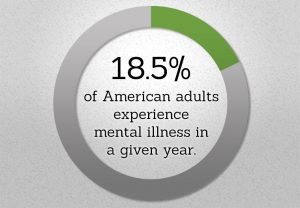Learn more about upcoming support groups or events with JFS.

Caring for an ill family member can take a toll. According to the National Alliance on Mental Illness’s (NAMI) Depression Survey, 50 percent of caregivers who responded had been diagnosed with depression themselves.
I remember a mom and dad in one of my classes who brought their son living with schizophrenia to the class with them. He sat in the car with his dog while they attended Family-to-Family — a practice they utilized everywhere they went because he was too anxious to stay alone. They had not had any respite from being caregivers for over a dozen years. This couple did not know how to give voice to their son’s needs.
By the end of the course they had become advocates for him. He was doing better on a new medication that they had determined from information in the class might work better; they had gotten him a case manager, and at their urging, his sister had become much more involved as a helper and friend. In Class 12 they announced they were going to take their first vacation away together in 13 years — a step which represented a real sea-change in their lives.
Given the isolation and silencing we experience as families caring for loved ones with mental illness, it is quite a journey from ignorance to empowerment. When families come to us, most are still immobilized by trauma and know absolutely nothing about mental illness or the existing resources for helping their family members. In the recent study, scores on constructive emotional focusing were higher after taking Family-to-Family, as was the rating of participants’ skills related to family functioning. Many participants tell us that this effect is exponential. We aren’t just teaching the people in the room — they, in turn, are reaching out to the rest of the family.
Part of the Family-to-Family model of recovery from trauma includes a last step in which you say, “Oh, now I understand the meaning and significance of what has happened to us — what I’ve learned through my troubles can help someone else.” Years ago when the program began, I was sure of this one thing: family members would make ideal teachers for other family members. The fact that Family-to-Family will soon celebrate its 20th anniversary is a testament to the staying power, the gumption and dedication of NAMI members.
Excerpted from a 2010 NAMI blog. You can read the rest of the article here. Contact JFS to learn more about Supported Living services for adults with mental illness.
By Joyce Burland, Director of NAMI’s Family-to-Family Program.
Source: https://www.nami.org/Learn-More/Mental-Health-By-the-Numbers#sthash.7t6hKrcb.dpuf



